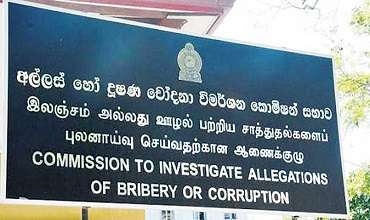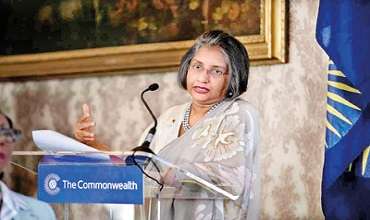Sri Lanka’s Central Bank reduces interest rates
The Central Bank on Thursday reduced interest rates saying the decision was taken at a meeting of the Monetary Board of the Central Bank of Sri Lanka, on May 31.
It was decided to reduce the Standing Deposit Facility Rate (SDFR) and the Standing Lending Facility Rate (SLFR) of the Central Bank by 250 basis points to 13 per cent and 14 per cent, respectively.
“The Board arrived at this decision with a view to easing monetary conditions in line with the faster than expected slowing of inflation, gradual dissipation of inflationary pressures and further anchoring of inflation expectations. The commencing of such monetary easing is expected to provide an impetus for the economy to rebound from the historic contraction of activity witnessed in 2022, while easing pressures in the financial markets,” it said in a statement.
The statement said:
Headline inflation (year-on-year), based on the Colombo Consumer Price Index (CCPI), continued the deceleration path, faster-than-projected earlier, supported by the lagged impact of tight monetary and fiscal policies, strengthening of the Sri Lanka rupee, reduction in fuel and gas prices, normalisation of food prices and the favourable impact of the statistical base effect. The full pass-through of the large appreciation of the exchange rate observed recently is yet to be reflected in the price levels, and it would quicken the disinflation process, as the prices of imported goods are expected to decline further in the period ahead. The favourable statistical base effect due to large month-on-month inflation that materialised during the last year is expected to slow inflation significantly in the next few months as well. Accordingly, as per the latest projections of the Central Bank, headline inflation is forecast to reach single digit levels in early Q3-2023, and stabilise around mid-single digit levels over the medium term.
During the four months ending April 2023, the trade deficit decreased notably, compared to a year earlier, reflecting mainly the subdued import expenditure, which outweighed the impact of moderation of external demand for merchandise exports. Inflows to the domestic forex market remain robust following the approval of the Extended Fund Facility (EFF) from the International Monetary Fund (IMF). The significant revival of workers’ remittances and earnings from tourism continued to build resilience in the external sector. The renewed foreign investor appetite for short term government securities has also helped improve forex liquidity in the recent months. The exchange rate, which is allowed to be determined by market forces, continues to reflect positive market sentiments underpinned by the improvement in liquidity in the domestic forex market. The Central Bank has absorbed a sizeable amount of foreign exchange from the domestic forex market thus far in 2023, resulting in a steady increase in gross official reserves (GOR). As of end May 2023, the level of GOR is estimated to have surpassed US$3 billion, including the swap facility from the People’s Bank of China. Reflecting the improved balance of payments (BOP) conditions, the Central Bank relaxed the cash margin deposit requirements imposed on selected imports in May 2023, and further measures will be initiated to loosen capital flow restrictions in the period ahead. Further, the Monetary Board viewed that a gradual phasing out of the existing import restrictions would need to commence soon. The continuation of the IMF-EFF supported programme, further financial assistance from international development partners, such as the Asian Development Bank (ADB) and the World Bank, and renewed investor appetite, coupled with the advances in the debt restructuring process, are expected to ease the BOP constraint significantly in the period ahead, supporting the recovery in domestic economic activity.
The external sector, which underwent an unprecedented setback in 2022, begins to demonstrate improved performance During the four months ending April 2023, the trade deficit decreased notably, compared to a year earlier, reflecting mainly the subdued import expenditure, which outweighed the impact of moderation of external demand for merchandise exports. Inflows to the domestic forex market remain robust following the approval of the Extended Fund Facility (EFF) from the International Monetary Fund (IMF). The significant revival of workers’ remittances and earnings from tourism continued to build resilience in the external sector. Domestic economic activity is expected to rebound gradually from late 2023
As reflected by leading indicators, economic activity remains subdued thus far during 2023, reflecting the protracted impact of the severe economic stresses in 2022 and the resultant tighter monetary and fiscal policies needed to support the restoration of macroeconomic stability. The economy is projected to rebound gradually from late 2023, supported by the easing of monetary conditions, improvements in business and investor sentiments along with the realisation of improved foreign exchange inflows, the faster recovery of the tourism sector, and the implementation of growth promoting policy measures.
With greater macroeconomic stability being achieved through corrective policy measures, particularly in terms of faster-than-expected deceleration of inflation thus far during 2023 and the benign inflation outlook and the easing of the BOP pressures, the Monetary Board of the Central Bank of Sri Lanka, upon carefully assessing the current and expected developments, decided to relax the stance of monetary policy and reduce the policy interest rates. This move is expected to accelerate the normalisation of the interest rate structure in the period ahead and broadbase the recovery of activity in the economy and ease pressures in the financial markets, thereby steering the economy towards a rebound phase.
The Board assessed both upside and downside risks to the inflation projections in the near to medium term and viewed that risks to the inflation projections, on balance, are tilted to the downside in the medium term. Faster deceleration of inflation and lower probability of excessive demand pressures during the economic rebound phase creates space for a gradual policy relaxation in the period ahead. The Board underscored the need for a quicker pass-through of the benefit of the relaxed monetary policy stance to the stakeholders of the economy. The financial institutions, led by LCBs, are expected to adjust the market interest rates swiftly in line with the changes in the policy interest rates. Furthermore, the Board also recommended requesting the Government to consider phasing out the remaining restrictions on most items of merchandise imports. The Monetary Board will continue to assess risks to both inflation and GDP growth projections, among others, and stand ready to take appropriate measures to ensure and sustain macroeconomic stability in the event of crystallising any risks to the baseline projections.
- ENDS -
-
Still No Comments Posted.














Leave Comments